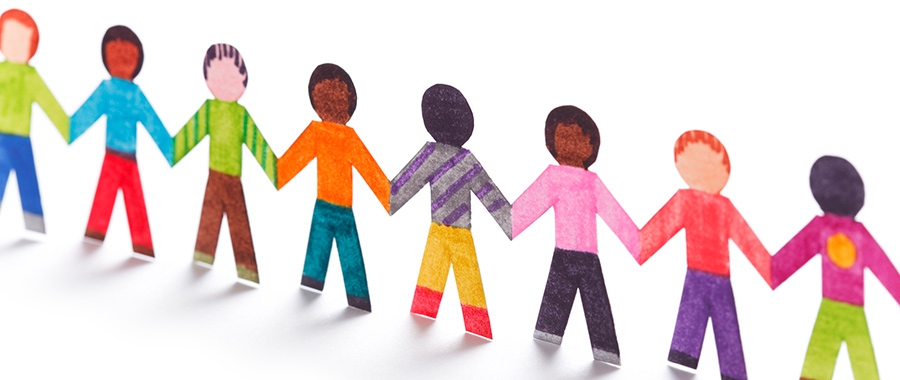The views expressed in our content reflect individual perspectives and do not represent the authoritative views of the Baha'i Faith.
When Abdu’l-Baha elucidated a formula for successful social and economic development a century ago, he asked humanity to develop an entirely new consciousness.
That consciousness, Abdu’l-Baha said, pivots around this central truth in the modern age:
… the oneness of the world of humanity—that all are servants of God and belong to one family; that God has created all and, therefore, His bestowals are universal; and that His providence, training, sustenance and loving-kindness surround all mankind. – Abdu’l-Baha, The Promulgation of Universal Peace, p. 106.
From a Baha’i standpoint, achieving the organic oneness of humanity requires adherence to certain spiritual principles: justice and equity; the equality of women and men; promoting trustworthiness and a high moral standard; unity in diversity; and independent investigation of the truth. He set forth those ideals as prerequisites for the social, economic and spiritual development of human civilization.
Justice and equity. This does not necessarily mean giving the same to all. Some have greater needs or are more disadvantaged—because of lack of education, prejudice against their ethnic or racial group or because of mental or physical handicaps. They may need greater attention than others. In general, however, the Baha’i community concentrates on removing social barriers rather than on helping the disadvantaged climb over these barriers. Thus rather than focusing on using positive discrimination to overcome racial or gender discrimination, the Baha’i community prefers to work on removing the prejudices in people’s minds that create the discrimination.
Promoting equality of women and men. This is not just an aim that will benefit women. The Baha’i teachings maintain that the denial of equality to women “promotes in men harmful attitudes and habits that are carried from the family to the workplace, to political life, and ultimately to international relations.” – The Universal House of Justice in Lights of Guidance, p. 618. Welcoming women into a greater social role will promote a more cooperative (rather than competitive) society, will make politics less confrontational and will help to bring peace to the world. Indeed Baha’is believe that “The emancipation of women, the achievement of full equality between the sexes,” is not just something that will help peace come about, it “is one of the most important. . . pre-requisites of peace.” – Shoghi Effendi, Ibid.
Promoting trustworthiness and high moral standard—especially in the leaders of society. Many people today are disillusioned with politicians and therefore distrustful of the political process. Only through a return to high moral standards in public and a general movement towards democracy and openness and accountability can confidence be restored and corruption be conquered.
Unity in diversity. The unity of the human race is one of the fundamental principles of the Baha’i teachings. It implies the realization by each individual of his or her interdependence and oneness with every other human being. Baha’u’llah’s injunction is that the human race “become as one soul and one body.” – Gleanings from the Writings of Baha’u’llah, p. 213. But this unity does not mean uniformity. Abdu’l-Baha spoke often about the importance of the diversity of human culture, of race and types.
Independent investigation of the truth. Baha’u’llah wrote that through justice:
… thou shalt see with thine own eyes and not through the eyes of others, and shalt know of thine own knowledge and not through the knowledge of thy neighbour. – Baha’u’llah, The Hidden Words, p. 4.
In this way, each human being develops insights and skills. The Baha’i teachings also encourage the collective search for truth through consultation, drawing on the experience and skills of the group and resulting in a greater degree of unity of purpose and action. In this way the inherent nobility and independence of all human beings is advanced.
When we can satisfy ourselves that a social and economic development project will bring about both material gains and spiritual benefits, then it can be said to have met Abdu’l-Baha’s criteria—and will have a greater chance of producing positive progress and a net amount of good:
No matter how far the material world advances, it cannot establish the happiness of mankind. Only when material and spiritual civilization are linked and coordinated will happiness be assured. Then material civilization will not contribute its energies to the forces of evil in destroying the oneness of humanity, for in material civilization good and evil advance together and maintain the same pace. For example, consider the material progress of man in the last decade. Schools and colleges, hospitals, philanthropic institutions, scientific academies and temples of philosophy have been founded, but hand in hand with these evidences of development, the invention and production of means and weapons for human destruction have correspondingly increased. In early days the weapon of war was the sword; now it is the magazine rifle. Among the ancients, men fought with javelins and daggers; now they employ shells and bombs. Dreadnoughts are built, torpedoes invented, and every few days new ammunition is forthcoming.
All this is the outcome of material civilization; therefore, although material advancement furthers good purposes in life, at the same time it serves evil ends. The divine civilization is good because it cultivates morals. Consider what the Prophets of God have contributed to human morality. Jesus Christ summoned all to the Most Great Peace through the acquisition of pure morals. If the moral precepts and foundations of divine civilization become united with the material advancement of man, there is no doubt that the happiness of the human world will be attained and that from every direction the glad tidings of peace upon earth will be announced. Then humankind will achieve extraordinary progress, the sphere of human intelligence will be immeasurably enlarged, wonderful inventions will appear, and the spirit of God will reveal itself; all men will consort in joy and fragrance, and eternal life will be conferred upon the children of the Kingdom. Then will the power of the divine make itself effective and the breath of the Holy Spirit penetrate the essence of all things. Therefore, the material and the divine, or merciful, civilizations must progress together until the highest aspirations and desires of humanity shall become realized. – Abdu’l-Baha, The Promulgation of Universal Peace, pp. 109-110.
















Comments
Sign in or create an account
Continue with Googleor